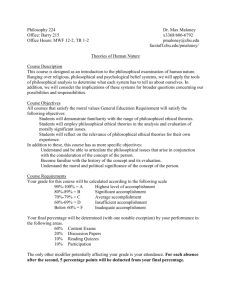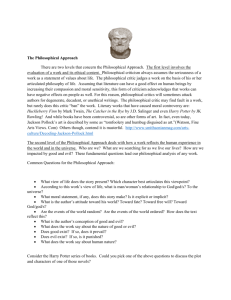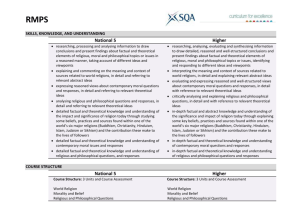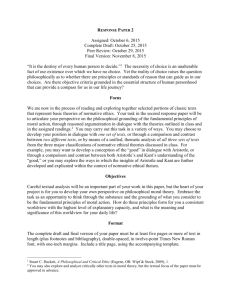may 2012 Curriculum Events – Course Aims and Structure
advertisement
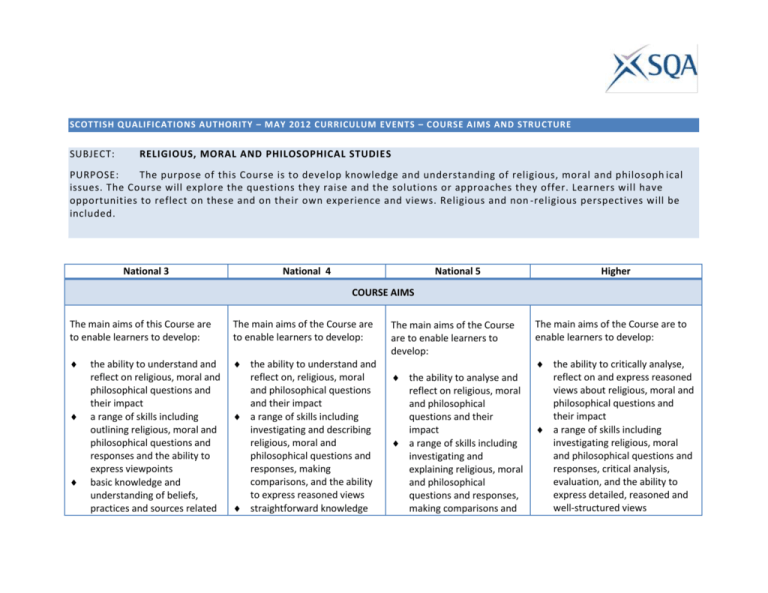
SCOTTISH QUALIFICATIONS AUTHORITY – MAY 2012 CURRICULUM EVENTS – COURSE AIMS AND STRUCTURE SUBJECT: RELIGIOUS, MORAL AND PHILOSOPHICAL STUDIES PURPOSE: The purpose of this Course is to develop knowledge and understanding of religious, moral and philosoph ical issues. The Course will explore the questions they raise and the solutions or approaches they offer. Learners will have opportunities to reflect on these and on their own experience and views. Religious and non -religious perspectives will be included. National 3 National 4 National 5 Higher COURSE AIMS The main aims of this Course are to enable learners to develop: The main aims of the Course are to enable learners to develop: the ability to understand and reflect on, religious, moral and philosophical questions and their impact a range of skills including investigating and describing religious, moral and philosophical questions and responses, making comparisons, and the ability to express reasoned views straightforward knowledge the ability to understand and reflect on religious, moral and philosophical questions and their impact a range of skills including outlining religious, moral and philosophical questions and responses and the ability to express viewpoints basic knowledge and understanding of beliefs, practices and sources related The main aims of the Course are to enable learners to develop: the ability to analyse and reflect on religious, moral and philosophical questions and their impact a range of skills including investigating and explaining religious, moral and philosophical questions and responses, making comparisons and The main aims of the Course are to enable learners to develop: the ability to critically analyse, reflect on and express reasoned views about religious, moral and philosophical questions and their impact a range of skills including investigating religious, moral and philosophical questions and responses, critical analysis, evaluation, and the ability to express detailed, reasoned and well-structured views National 3 to world religions basic knowledge and understanding of religious, moral and philosophical questions and responses to them National 4 and understanding of beliefs, practices and sources related to world religions straightforward knowledge and understanding of religious, moral and philosophical questions and responses to them National 5 the ability to express detailed and reasoned views detailed factual and abstract knowledge and understanding of beliefs, practices and sources related to world religions detailed factual and theoretical knowledge and understanding of religious, moral and philosophical questions and responses to them Higher in-depth factual and abstract knowledge and understanding of beliefs, practices and sources related to world religions in-depth factual and theoretical knowledge and understanding of religious, moral and philosophical questions and responses to them STRUCTURE, ASSESSMENT AND HIERARCHIES Course Structure: 3 Units Course Structure: 3 Units and Added Value Unit World Religion 1) Apply knowledge and understanding of the impact and significance of religion today World Religion 1) Apply knowledge and understanding of the impact and significance of religion today Morality and Belief 1) Apply knowledge and understanding of contemporary moral Morality and Belief 1) Apply knowledge and understanding of contemporary moral Course Structure: 3 Units and Course Assessment World Religion 1) Apply knowledge and understanding of the significance and impact of religion today Morality and Belief 1) Apply knowledge and understanding of Course Structure: 3 Units and Course Assessment World Religion 1) Apply knowledge and understanding of the impact and significance of religion today Morality and Belief 1) Apply knowledge and understanding of contemporary moral questions and responses National 3 questions and responses Religious and Philosophical Questions 1) Apply knowledge and understanding of religious and philosophical questions and responses In a hierarchy National 4 questions and responses 2) Express reasoned views about religious and nonreligious responses to contemporary moral questions Religious and Philosophical Questions 1) Apply knowledge and understanding of religious and philosophical questions 2) Describe a religious and philosophical question and responses and Added Value Unit: RMPS Assignment 1) Research and use information relating to a religious, moral or philosophical topic or issue In a hierarchy National 5 contemporary moral questions and responses 2) Express detailed and reasoned views about religious and nonreligious responses to contemporary moral questions Religious and Philosophical Questions 1) Apply knowledge and understanding of religious and philosophical questions 2) Express detailed and reasoned views about religious and nonreligious responses to contemporary moral questions and Course Assessment Question Paper and Assignment In a hierarchy SKILLS, KNOWLEDGE AND UNDERSTANDING Higher 2) Evaluate religious and nonreligious responses to contemporary moral questions Religious and Philosophical Questions 1) Apply knowledge and understanding of religious and philosophical questions 2) Critically analyse a religious and philosophical question and responses and Course Assessment Question Paper and Assignment In a hierarchy National 3 understanding and commenting on the meaning of sources related to world religions, in basic terms expressing views about contemporary moral questions and responses, in basic terms outlining religious and philosophical questions and responses, in basic terms basic knowledge and understanding of the impact and significance of religion today through studying some beliefs, practices and sources found within one of the world’s six major religions (Buddhism, Christianity, Hinduism, Islam, Judaism or Sikhism) and the contribution these make to the lives of followers basic knowledge and understanding of contemporary moral issues, and responses basic knowledge and understanding of religious and National 4 National 5 Higher researching and using information to present findings about straightforward, mainly factual elements of religious, moral and philosophical topics or issues in a reasoned manner describing and commenting on the meaning and context of sources related to world religions, in straightforward terms expressing views about contemporary moral questions and responses, in straightforward terms describing religious and philosophical questions and responses, in straightforward terms straightforward factual knowledge and understanding of the impact and significance of religion today through studying some beliefs, practices and sources found within one of the world’s six major religions researching, processing and analysing information to draw conclusions and present findings about factual and theoretical elements of religious, moral and philosophical topics or issues in a reasoned manner, taking account of different ideas and viewpoints explaining and commenting on the meaning and context of sources related to world religions, in detail and referring to relevant abstract ideas expressing reasoned views about contemporary moral questions and responses, in detail and referring to relevant theoretical ideas analysing religious and philosophical questions and responses, in detail and referring to relevant theoretical ideas researching, analysing, evaluating and synthesising information to draw detailed, reasoned and well-structured conclusions and present findings about factual and theoretical elements of religious, moral and philosophical topics or issues, identifying and responding to different ideas and viewpoints interpreting the meaning and context of sources related to world religions, in detail and explaining relevant abstract ideas evaluating and expressing reasoned and well-structured views about contemporary moral questions and responses, in detail and explaining relevant theoretical ideas critically analysing and explaining religious and philosophical questions, in detail and explaining relevant theoretical ideas in-depth factual and abstract knowledge and understanding of the significance and impact of National 3 philosophical questions and responses National 4 (Buddhism, Christianity, Hinduism, Islam, Judaism or Sikhism) and the contribution these make to the lives of followers straightforward knowledge and understanding of contemporary moral issues and responses straightforward knowledge and understanding of religious and philosophical questions and responses National 5 detailed factual and theoretical knowledge and understanding of the impact and significance of religion today through studying some beliefs, practices and sources found within one of the world’s six major religions (Buddhism, Christianity, Hinduism, Islam, Judaism or Sikhism) and the contribution these make to the lives of followers detailed factual and theoretical knowledge and understanding of contemporary moral issues and responses detailed factual and theoretical knowledge and understanding of religious and philosophical questions, and responses Higher religion today through explaining some key beliefs, practices and sources found within one of the world’s six major religions (Buddhism, Christianity, Hinduism, Islam, Judaism or Sikhism) and the contribution these make to the lives of followers in-depth factual and theoretical knowledge and understanding of contemporary moral questions and responses in-depth factual and theoretical knowledge and understanding of religious and philosophical questions and responses


